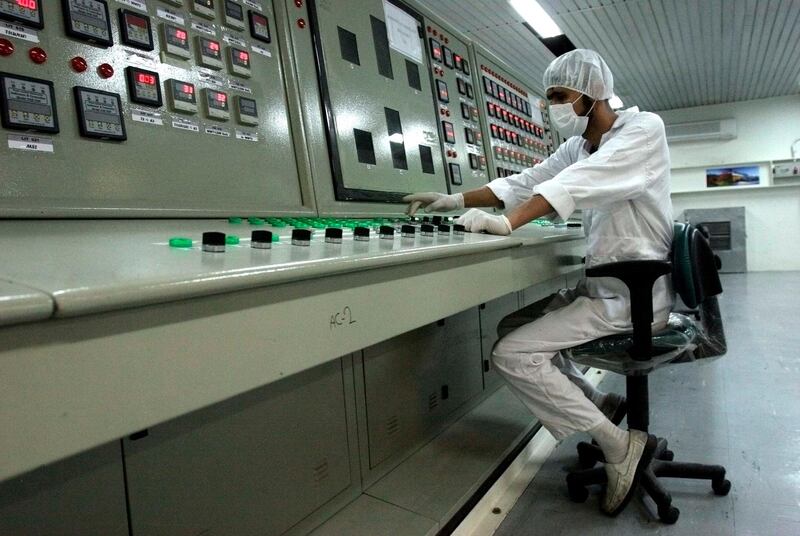Iran has announced the reopening a nuclear plant idle for nine years as it prepares to increase uranium enrichment capacity if a nuclear deal with world powers falls apart.
US-Iranian tensions have soared since President Donald Trump pulled Washington out of the 2015 nuclear accord, calling it deeply flawed. Under the deal, Iran restricted its enrichment programme to ease concerns that it was developing nuclear weapons and in return for relief from sanctions.
European signatories are trying to save the accord, which they see as crucial to forestalling an Iranian nuclear weapon. However, supreme leader Ayatollah Ali Khamenei ordered the Atomic Energy Organisation of Iran this month to start preparations to upgrade enrichment capacity in case the European efforts fail.
The AEOI said on Wednesday that in response to Mr Khamenei's order and Mr Trump's renunciation of the deal, a plant for the production of UF6, the feedstock for centrifuge machines that enrich uranium, had been relaunched and a barrel of yellow cake has been delivered there.
Uranium ore, known as yellow cake, is converted into a gas called uranium hexafluoride (UF6) before enrichment.
The UF6 factory, which had been inactive since 2009 due to a lack of yellow cake, is part of the Isfahan uranium conversion facility, according to the AEOI statement on its website.
"Iran has imported a huge amount of yellow cake since the nuclear deal" in 2015, and had also produced some domestically, it said.
_______________
Read more:
[ Iran FM echoes Pompeo in twitter rebuttal over protests ]
[ US pushes European and Asian states for zero oil imports from Iran ]
[ Iran's top leader says harm to economy must be punished ]
_______________
The International Atomic Energy Agency, the UN nuclear watchdog that is policing Iran's compliance with the nuclear deal, said on June 5 that the AEOI had informed it of "tentative" plans to resume production of UF6.
The move is symbolic and permissible under the nuclear deal, which allows Iran to enrich uranium to 3.67 per cent, far below the 90 per cent of weapons-grade uranium, and caps its stock of enriched uranium hexafluoride at 300 kilograms.
President Hassan Rouhani has written to counterparts in France, Germany and Britain, warning that time to salvage the nuclear deal is running out.
Mr Rouhani's chief of staff, Mahmoud Vaezi, said the president had expressed Iran's demands "very clearly" in his letter, according to the government's website.
Washington will start reimposing some economic penalties on Tehran in August and more in November.
The tightening of US sanctions pressure has set Washington and Tehran, adversaries since Iran's 1979 Islamic Revolution, back on a course of confrontation after a period of cautious detente under Mr Trump's predecessor, Barack Obama.
The US on Wednesday urged fellow members of the UN Security Council to punish Iran for "malign behaviour" in the Middle East, including supplying weapons to the Houthi rebels in Yemen.
"When confronted with a country that continually violates this council's resolutions, it is imperative that we pursue meaningful consequences," said Jonathan Cohen, the US deputy ambassador to the United Nations.
"That is why we urge members of this Council to join us in the imposition of sanctions that target Iran's malign behaviour in the region," he said.
He was speaking at the first meeting of the Security Council to discuss the Joint Comprehensive Plan of Action, as the nuclear deal is formally known, since Mr Trump announced on May 8 that the US was pulling out of the agreement.
The UN nuclear watchdog said in its latest report on May 24 that Tehran was meeting its commitments under the deal.
Mr Cohen once again accused Iran of supplying missiles to the Houthi rebels in Yemen in violation of an international arms embargo.
In a recent report, the United Nations said that missile components fired at Saudi Arabia had been manufactured in Iran, but that UN officials were unable to determine if they had been delivered before or after the July 2016 imposition of an arms embargo on Yemen.
"Dismantling a nuclear deal that is working would certainly not put us in a better position to discuss other issues," said EU ambassador to the UN Joao Vale de Almeida, referring to Tehran's ballistic activities and its influence in the Middle East.
"The collapse of this major achievement would mark a serious step backwards for the region, for the non-proliferation regime but also for our security for all, which would potentially have serious consequences," said French ambassador Francois Delattre.





